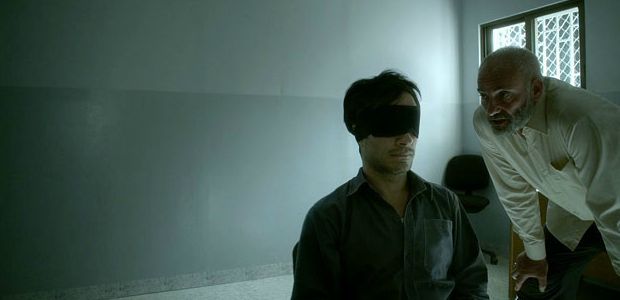Over nearly two decades on The Daily Show, Jon Stewart has reported on stranger-than-fiction stories with a sophisticated sense of humor and an ardent refusal to take himself too seriously. But when buckling down to tell the troubling true story of journalist Maziar Bahari in Rosewater, the TV personality turned film director discards these signatures in favor of earnestness and a predominantly solemn tone. It's a bold choice, but does it pay off?
Based on Maziar Bahari's memoir Then They Came For Me, Rosewater focuses on how the Iranian native/Newsweek journalist was thrown into prison and accused of treason following the 2009 election between Mahmoud Ahmadinejad and Mir-Hossein Mousavi. The Iranian government claimed Bahari was a spy. As evidence, they showed him an interview he had done with Jason Jones in a comedy bit for The Daily Show With Jon Stewart. It was a moment so surreal that Bahari laughs, but it's one of the few found in Rosewater.
Mexican actor Gael Garcia Bernal stars as Maziar Bahari, bringing an easy affability to a man we're introduced to hungover, in his underwear as he's accosted by sneering government agents. As Bahari was forced to spend much of his time in prison with a blindfold over his eyes, Bernal is given an immediate handicap in creating a compelling performance. However, he overcomes, offering a portrayal that is tempered with anxiety, pride, and hope. As a journalist well aware of the risk of covering the Iranian elections of 2009, Bahari initially hides his camera when he comes across truths Ahmadinejad's administration would rather be ignored. Bernal's subtle shifts from easy smiles to fretful furrowed eyebrows hint at the risks of his job, while he jovially tells his British and pregnant wife via Skype that she has no reason to worry. He's a charming liar. And it's going to save his life.
Focusing on the course of Bahari's 118 days in detainment, Rosewater is predominantly set within a few sparse and cold locations. While Stewart offers 11 days prelude to the arrest for context and characterization, as well as a few warmly colored flashbacks, much of the film boils down to the relationship between Bahari and his interrogator (an uneven but striking turn from Kim Bodnia). It's a twisted dynamic, with one being accused of a crime that he didn't commit, and the other loathing the job he has been assigned.
There are moments of kindness in Rosewater. Some are accidental, as when the interrogator pushes for Bahari to sign a confession that claims he is a CIA ally who has willfully created propaganda to make Iran look bad. This makes for a promising setup, and has a few moments that are electric with tension. But other scenes of beatings and repetitive interrogations feel forced, like an obligation to include details from the book (repeated references to New Jersey, Stewart's home state) that gum up the plot's pacing.
After a swiftly plotted and sharp first act, the second act spins its wheels as Bahari struggles to cope in prison. He has highs and lows as days are documented via title cards. Bernal offers a haunting portrayal of a man on the brink, but the film’s second act still feels one note. Finally, as we switch from the second to the third act, Stewart switches gears, allowing some life and humor back into his narrative. It's like a breath of fresh air, and it brings Rosewater back on track as it pulls into a moving and unnerving conclusion.
You might think I'm annoyed that Rosewater is a drama from a comedian. I'm not. Considering the subject matter, I totally understand Stewart's sidestepping satire or slapstick. However, as someone who has long reveled in the way he weaves righteous moral indignation into sharply funny and meaningful monologues, I expected to see some of that fire in Rosewater. And yes, I was disappointed that it's absent. However, it should be noted that Stewart has done a hell of a job for a first time filmmaker, especially considering he stepped so far out of his comfort zone.
Rosewater is beautifully shot, revealing Iran to be a place of both bustle and decay, religiousness and secularism. There are small moments--like one where a blind-folded Bahari reaches his hand high over his head to feel the sunlight he's not allowed to see--that with a gentle grace communicate the movies themes of fighting for freedom. The score is lively and lovely. And Stewart gives a bit of panache to a voiceover monologue about Bahari's family history by blasting footage of his family on the walls around him as he strolls--still a free man--through a city. There's pacing problems, but the plot is laid out with care to make sure viewers unfamiliar with the particulars of the 2009 Iranian elections won't get lost. For all this, Rosewater is a competent political drama and a noteworthy first feature. However, without that smile and wink that Stewart as a TV personality is so known for, the film feels a bit too much like a well-intentioned but dry civics lesson.
Staff writer at CinemaBlend.
Most Popular





